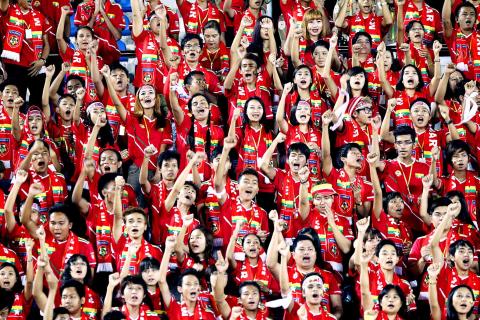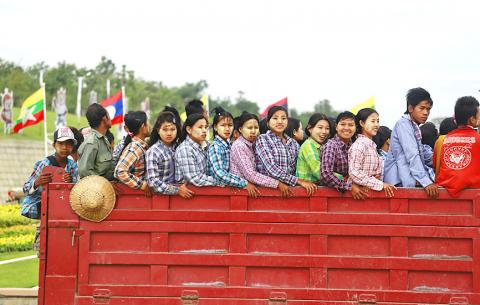Myanmar officially welcomes thousands of athletes today for the Southeast Asian Games, an event billed as a coming-out party for the former pariah nation emerging from decades of international isolation. The opening ceremony for the regional showpiece is being held in a spotless, purpose-built 30,000-capacity stadium in Naypyidaw, the utilitarian capital built by secretive generals — far from the bustle of commercial capital Yangon.
Myanmar, formerly known as Burma, last hosted the Games more than four decades ago and the return of the multi-sport event comes as political and economic reforms sweep the impoverished nation following the dissolution of the ruling junta in 2011.
The Games are held every two years, offering regional bragging rights and a chance for athletes from lesser sporting nations to shine in sports ranging from athletics to the obscure cane-ball game chinlone and martial arts vovinam and pencak silat.

Photo: EPA
Myanmar currently top the medals table after accusations in the run-up that in excluding the likes of tennis and gymnastics, the host nation was guilty of of cherry-picking events to help home athletes.
Thousands of curious local fans have been lured to the games, with many determined to grasp the chance to interact with foreign guests.
“It’s so good for us, it’s so exciting... For a long time, people didn’t see what Myanmar was like and we didn’t see what other people were like. It’s a chance to change that,” 20-year-old aspiring tour guide Moh Moh Nay Wynn said.

Photo: Reuters
Local media, entirely state-controlled until recently, have reflected that buzz, but have also been peppered with appeals by officials for citizens to respect regional norms after years in the shadows.
A daily Southeast Asian Games official newspaper has carried notices from Myanmar’s soccer manager urging his players to refrain from robust tackling, while signs across the vast main complex appeal to locals not to spit betel nut — with limited success. Most of the 22-day competition has been taking place in Naypyidaw, a sleepy, planned city 300km north of Yangon, which hosts the early rounds of men’s soccer, plus body-building, weightlifting and kempo, a martial art.
And while the purpose-built facilities have won praise, the distance, lack of hotels and poor transport links between venues have left the event shorn of foreign fans.

Photo: EPA
The overwhelming majority of those who have made the journey are the thousands of athletes and media, but fears over empty seats appear to have eased with busloads of local students taking up free tickets.
“The Southeast Asian Games is important for the status of a country,” said Thiha Saw, a veteran journalist who has taken advantage of the thaw in press controls to publish a daily private newspaper.
“We haven’t held it for 44 years. As hosts, the country’s reputation grows. That is something Myanmar is seeking,” he said.

North Korea’s FIFA Under-17 Women’s World Cup-winning team on Saturday received a heroes’ welcome back in the capital, Pyongyang, with hundreds of people on the streets to celebrate their success. They had defeated Spain on penalties after a 1-1 draw in the U17 World Cup final in the Dominican Republic on Nov. 3. It was the second global title in two months for secretive North Korea — largely closed off to the outside world; they also lifted the FIFA U20 Women’s World Cup in September. Officials and players’ families gathered at Pyongyang International Airport to wave flowers and North Korea flags as the

Taiwan’s top table tennis player Lin Yun-ju made his debut in the US professional table tennis scene by taking on a new role as a team’s co-owner. On Wednesday, Major League Table Tennis (MLTT), founded in September last year, announced on its official Web site that Lin had become part of the ownership group of the Princeton Revolution, one of the league’s eight teams. MLTT chief executive officer Flint Lane described Lin’s investment as “another great milestone for table tennis in America,” saying that the league’s “commitment to growth and innovation is drawing attention from the best in the sport, and we’re

Coco Gauff of the US on Friday defeated top-ranked Aryna Sabalenka 7-6 (7/4), 6-3 to set up a showdown with Olympic champion Zheng Qinwen in the final of the WTA Finals, while in the doubles, Taiwan’s Chan Hao-ching was eliminated. Gauff generated six break points to Belarusian Sabalenka’s four and built on early momentum in the opening set’s tiebreak that she carried through to the second set. She is the youngest player at 20 to make the final at the WTA Finals since Denmark’s Caroline Wozniacki in 2010. Zheng earlier defeated Wimbledon champion Barbora Krejcikova of the Czech Republic 6-3, 7-5 to book

For King Faisal, a 20-year-old winger from Ghana, the invitation to move to Brazil to play soccer “was a dream.” “I believed when I came here, it would help me change the life of my family and many other people,” he said in Sao Paulo. For the past year and a half, he has been playing on the under-20s squad for Sao Paulo FC, one of South America’s most prominent clubs. He and a small number of other Africans are tearing across pitches in a country known as the biggest producer and exporter of soccer stars in the world, from Pele to Neymar. For